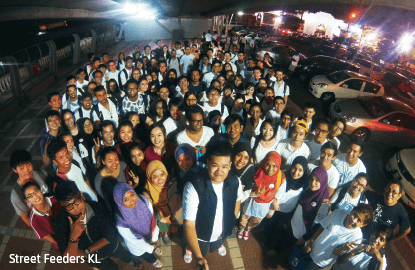
This article first appeared in #edGY, The Edge Malaysia Weekly, on December 21 - 27, 2015.
SINCE 2011, members of the Street Feeders of KL have been going around the streets of Kuala Lumpur on weekday nights bringing goodwill to the homeless.
On a typical night, they reach out to about 800 people in the Jalan Petaling, Kota Raya shopping centre and Jalan Masjid India areas with little packages of food.
While there are a handful of efforts to alleviate Kuala Lumpur’s homeless problem such as Kechara Soup Kitchen, Meals for All and Dapur Jalanan Kuala Lumpur, for Street Feeders of KL, the mission is more than just feeding the needy — they are aiming for zero street people in the Klang Valley.
“For every 15 people we reach out to, we hope that one will get off the streets. It’s a safe number to state, yet the numbers are growing, even though there are people getting off the streets. It’s crazy,” says Gary Conrad Liew, film producer and founder of Street Feeders of KL.
“Food distribution is a means for us to reach out to them and it’s the best thing that binds all Malaysians. We use this opportunity to really sit down and get to be their friends and family.”
To achieve zero homeless people in Kuala Lumpur, they will be working with Pertubuhan Perintis Malaysia on Project Odyssey, a rehabilitation and reintegration programme with the goal of creating jobs for the homeless.
The project, which will start next year, aims to address the psychosocial issues of homeless individuals and equip them with the necessary skills to enable them to gain employment.
“We want to offer them a place not only to have a warm shower or a meal but also to get job counselling and technical or vocational training with the hope of getting employed,” says Liew.
You can blame the individual or the government, but this growing urban problem cannot be ignored.
“The homeless are very much community-based regardless of religion and will gather at certain parts of the city. For example, the SEGi College area can have up to 120 people on any given night. That’s where they call home,” says Liew.
These people may be seen as drug addicts or bums but when you talk to them, they are very much like any one of us, he says.
“Their stories are very simple. They are just like us but had it a little bit harder. Maybe it was an illness or maybe they just ran out of cash. They’re more human than we think and anyone can become homeless at any given time.”
Liew has been working with the homeless for more than 15 years. He says in Kuala Lumpur, about 80% of the street people are men and a few of them are foreigners. And a good number of them have jobs.

“They hold menial jobs like construction workers and security guards. But they choose to live on the streets. I guess the cost of living doesn’t work out for them,” says Liew.
On the other side of the coin, it’s a matter of choice to sleep on the streets in order to send the money they earn back to their families. Liew points out that one can’t ignore how expensive living in the city has become.
“Even for people like you and me, if we didn’t have our parents helping us out, we might be homeless! It’s hard to afford a decent place anywhere! The economics of the city are failing them. It’s not enough to sustain themselves and this is a real issue,” he says.
“We can always sit comfortably in our homes and not do anything about it. But is that really the truth?”
Liew and his friends decided to set up the non-governmental organisation rather than wait for changes in policies to alleviate the situation. And it’s not exactly a cheap pastime — they spend up to RM2,500 for each session.
“Starting this out, I funded it myself. It came down to some nights where no one was willing to donate and I walked to my ATM to withdraw my own money. Now, we are slowly generating some funds by selling merchandise. We also have a little more people deciding to chip in.”
He stresses the need for the government to recognise street people as individuals and not treat them like criminals. It must acknowledge homelessness as a problem, he adds.
“Then, it must find ways to solve the problem. Feeding them is an intermediate step; it doesn’t help them in the long run. That is why I say feeding them is just a way of reaching out to them,” he says.
“I think poverty will always exist, just different levels of it. I believe homelessness is a simple problem that we can eradicate. We’re not talking about tens of thousands, just 3,000 to 5,000 in the city centre. It’s a workable number.”
Save by subscribing to us for your print and/or digital copy.
P/S: The Edge is also available on Apple's AppStore and Androids' Google Play.